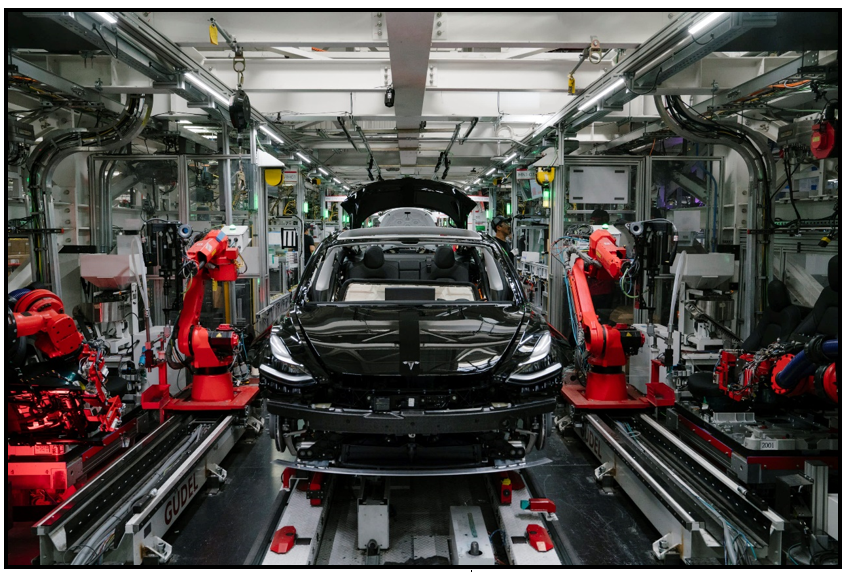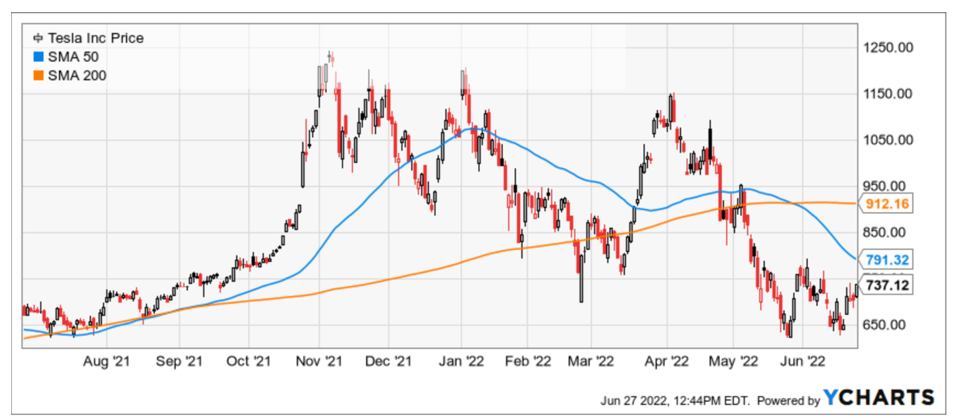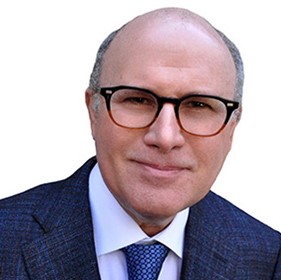Tesla (TSLA) is at the center of another controversy — its newest factories are burning through mountains of cash.
On Thursday, Bloomberg reported that Elon Musk said factories in Berlin, Germany, and Austin, Texas, are money furnaces.
The headline amped up fear, uncertainty and doubt about the automaker. As a result, shares slipped as investors panicked.
Shareholders should beware: FUD works.
In fairness, Musk was simply being honest. New factories blaze through capital as they scale up production. Equipment costs, new employee training, stockpiling components from suppliers and ongoing construction costs can add up. These cash outlays are stacked up against limited production runs to work out the bugs.
The factories in Berlin and Austin represent the evolution of the wildly successful Giga Shanghai facility, opened in 2019. That Chinese plant was developed to scale up production of the Tesla Model 3, a mass-market, $45,000 sedan. It had a state-of-the-art robotics system, a massive footprint and 210 acres for future development.
Giga Shanghai started production at only 1,000 units per week. However, Tesla's growing the facility, ultimately targeting 100,000 units per month. Sources in China reported last week that insured Tesla units made in China between June 13 through June 19 were 17,949 — that's 2,564 vehicles per day!

Berlin and especially Austin are bigger, more technologically advanced gigafactories, so it looks like Tesla is on the right track to reach its production goals.
Unfortunately, Musk has made a recent habit of giving his critics ammunition. The money-furnace comment reported at Bloomberg reminds investors of a 2018 report: "Tesla Doesn't Burn Fuel, It Burns Cash."
At the time, scaling up production of Model 3 was a particularly dark time for shareholders, with supply-chain bottlenecks plus manufacturing naivete leading to production delays. Musk later admitted that manufacturing hell pushed the company to the brink of bankruptcy.
Thankfully, now Tesla is nowhere near insolvency.
In 2021, the company based in Austin generated $11.5 billion in cash from operations, up 94% from 2020.
Its backlog of new orders and made-to-order business model means that every new Tesla has a waiting buyer. That's a luxury in a sector still plagued by semiconductor shortages and rising raw material costs.
Related Post: EV Recalls Prove Tesla's Dominance
FUD is another matter, though.
Negative Tesla stories in the press drive clicks, likes and shares, the currency of the advertising-centric media ecosystem. These negative stories, meaningful or not, impact investor sentiment and ultimately drive Tesla shares lower.
The National Highway Traffic Safety Administration launched a safety probe of Tesla's autopilot advanced driver assistance system in 2021. The investigation looked into 17 crashes and one fatality across 830,000 Tesla cars and SUVs.
In November, Consumer Reports ran a story raising fear that Tesla autopilot is actually less safe than other vehicles. Even though Tesla's autopilot requires drivers to remain fully in control of their vehicle, like all ADAS software, its shares slipped below $1,000 a month after reaching a high of $1,250.
And the stock was trading above $1,000 in late April, immediately before Musk said he would personally buy Twitter (TWTR). Although Tesla wasn't directly involved the transaction, Musk pledged his own shares, leading analysts to raise uncertainty about a possible margin call. The stock ultimately fell to $623 during the following month.
Related Post: Electric Vehicle Makers Struggle to Hold Charge
Still, it's actually legacy auto companies that face an uphill battle.
Many automakers arrived late to EVs, and some of their perceived strengths are actually weaknesses. Volkswagen (VWAGY), the industry leader by total auto sales, has been fighting component shortages critical to electrification.
The German company sold only 415,131 EVs during 2021, compared with the 936,172 units sold by Tesla.
Ford Motor (F) makes a well-received Mustang Mach E and F-150 Lightning pickup, yet the company is struggling to figure out how its dealer network can survive the transition to a made-to-order business model.
Personally, I like Tesla's business model and its place in a sector that should get much larger. However, shareholders should be ready for an onslaught of FUD in the weeks ahead. Shares could decline much further from here.
In times like these that are riddled with FUD, I recommend checking out my new Crisis Profit Trader service to know what to do during hard times.
As always, remember to always do your own diligence before taking any action.
Best wishes,
Jon D. Markman


